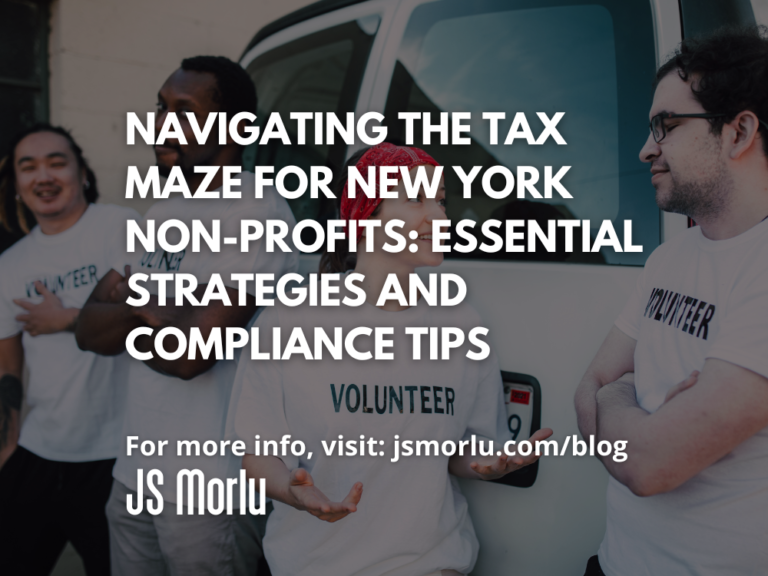Non-profit organizations in New York State have a critical role in serving their communities and pursuing their missions. However, they also face a complex web of tax laws and regulations that can be daunting to navigate. Failure to comply with these requirements can lead to significant penalties and even the revocation of tax-exempt status. In this comprehensive guide, we will explore the essential tax strategies and compliance tips that New York non-profits need to ensure their financial stability and legal standing.
Understanding the Tax Landscape for New York Non-Profits
Federal Income Tax Exemption
One of the fundamental benefits for non-profit organizations in the United States, including those in New York, is their exemption from federal income tax under section 501(c)(3) of the Internal Revenue Code. This exemption allows non-profits to channel their resources towards their missions rather than tax obligations. However, it’s essential to note that this federal exemption does not automatically grant exemption from state and local taxes.
State and Local Tax Obligations
While New York non-profits may be exempt from federal income tax, they are subject to various state and local taxes, which can include property taxes, sales taxes, and payroll taxes. These obligations vary depending on the location and nature of the non-profit’s activities. Therefore, it’s crucial for non-profits to understand their specific tax obligations at the state and local levels to ensure compliance.
Filing Annual Reports
Non-profits in New York are required to file an annual Form CHAR500 with the New York State Attorney General’s Charities Bureau. This report provides essential information about the non-profit’s finances, governance, and activities. Failure to file this report can result in penalties and jeopardize the non-profit’s tax-exempt status.
Federal Reporting: Form 990
Regardless of their revenue, non-profits in New York must file an annual Form 990 with the Internal Revenue Service (IRS). Form 990 is a comprehensive report that provides transparency about the non-profit’s finances and operations. It helps the IRS and the public assess whether the organization is fulfilling its tax-exempt purposes. Non-profits must ensure the accurate and timely submission of Form 990 to maintain their tax-exempt status.
Key Tax Strategies for New York Non-Profits
1. Seek Professional Tax Advice
Navigating the tax maze for non-profits in New York can be complex and challenging. To ensure compliance and make informed financial decisions, it’s advisable for non-profits to engage the services of qualified tax advisors or certified public accountants (CPAs) with expertise in non-profit taxation. These professionals can provide guidance on tax planning, reporting, and compliance, helping non-profits avoid costly mistakes.
2. Maintain Accurate Financial Records
Accurate and complete financial recordkeeping is fundamental to tax compliance for non-profits. All financial transactions, including income, expenses, donations, and grants, must be properly documented. These records not only support tax reporting but also demonstrate the non-profit’s financial transparency, a crucial factor in maintaining public trust.
3. Ensure Financial Transparency
Transparency is a cornerstone of non-profit governance. Regularly sharing financial information with board members, staff, and the public fosters trust and demonstrates compliance with various reporting requirements. Non-profits should prioritize transparency in their operations to build credibility and support.
4. Monitor Unrelated Business Income
Non-profits should regularly review their income-generating activities to identify potential unrelated business income that could trigger unrelated business income tax (UBIT) liability. Implementing internal controls to minimize UBIT exposure is essential while maintaining a focus on the organization’s tax-exempt mission.
Compliance Tips for New York Non-Profits
1. Avoid Excessive Compensation
Non-profit organizations should ensure that employee compensation is reasonable and based on comparable market data. Providing excessive compensation can lead to IRS penalties or the revocation of tax-exempt status. Non-profits should establish clear guidelines for compensation practices to avoid compliance issues.
2. Prevent Inurement and Private Benefit
Non-profit organizations must avoid any direct or indirect inurement, which refers to providing financial benefits, to their directors, officers, or key employees. The organization’s resources should primarily serve its tax-exempt purpose and not unduly benefit any private individuals or stakeholders.
3. Stay Clear of Political Activities
Non-profits must refrain from engaging in any political activities or campaign interventions for or against political candidates. Violating this prohibition may result in the revocation of tax-exempt status or the imposition of excise taxes.
4. File Required Reports On Time
Timely filing of annual reports with the New York State Attorney General’s Charities Bureau and Form 990 with the IRS is essential for compliance. Missing deadlines can lead to penalties and jeopardize the non-profit’s tax-exempt status.
Conclusion
Navigating the tax maze for non-profit organizations in New York is a multifaceted challenge. Understanding the tax landscape, seeking professional advice, maintaining accurate records, ensuring financial transparency, and adhering to compliance tips are essential strategies for success. Non-profits play a vital role in their communities, and by following these tax strategies and compliance tips, they can continue their mission-driven work while staying in good legal standing. Remember, compliance is not only a legal requirement but also a way to build trust and credibility with donors, stakeholders, and the public.
JS Morlu LLC is a top-tier accounting firm based in Woodbridge, Virginia, with a team of highly experienced and qualified CPAs and business advisors. We are dedicated to providing comprehensive accounting, tax, and business advisory services to clients throughout the Washington, D.C. Metro Area and the surrounding regions. With over a decade of experience, we have cultivated a deep understanding of our clients’ needs and aspirations. We recognize that our clients seek more than just value-added accounting services; they seek a trusted partner who can guide them towards achieving their business goals and personal financial well-being.
Talk to us || What our clients says about us


